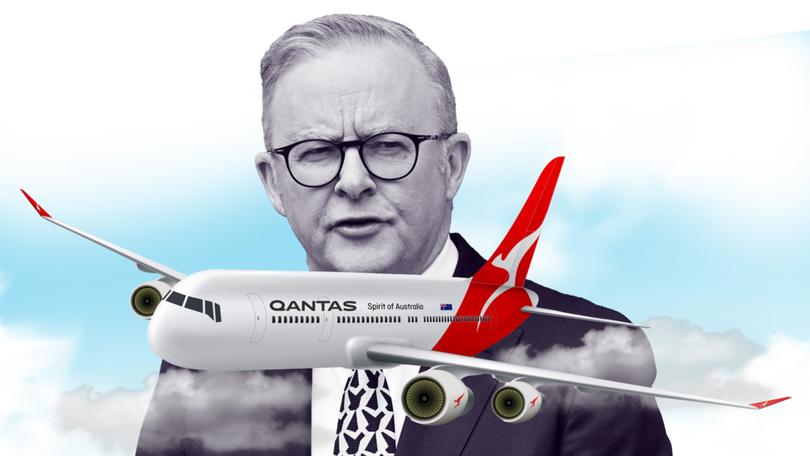MARK RILEY: Why I turned down an offer from Qantas to upgrade my seat on a flight in 2018
MARK RILEY: I might be the only person in commercial aviation history to have requested a flight downgrade. Today, I’m so glad I did.

The Qantas Customer Service manager at Dallas/Fort Worth Airport thought I was mad.
“Are you sure you want to do this sir?” she asked incredulously.
“Yes,” I insisted.
Sign up to The Nightly's newsletters.
Get the first look at the digital newspaper, curated daily stories and breaking headlines delivered to your inbox.
By continuing you agree to our Terms and Privacy Policy.“Well, this might take a while. I’ve never been asked to downgrade anyone before.”
That’s right. Downgrade.
Qantas had upgraded me to business class on the 18-hour Dallas-Sydney flight home from a trip to the White House in February 2018.
And I was having none of it. Many of my press gallery colleagues travelling with me thought I was mad, too.
But there was an important principle at play.
A monumental stuff-up on our flight to Washington DC had rerouted several of us to Baltimore in the neighbouring state of Maryland and sent our bags and camera equipment to Reagan Airport, three states away in Virginia.
The combination of that and lengthy delays on the way over had left us scrambling to reach DC to buy some fresh clothes and make it to the White House in time for the official meeting between Malcolm Turnbull and Donald Trump.
Our equipment and luggage didn’t arrive at the hotel until two days later, just before we left on a visit to New York.
It made doing our job incredibly tough. We had to borrow lights, cables and sound equipment to get by.
Everyone has an airline horror story. This was mine.
I sent out a couple of tweets registering my frustration with Qantas.
Their response was to upgrade me on the return flight, without telling me.
It was an obvious attempt at buying my silence. And it failed.
The way to maintain a clear conscience is to say no to offers of special treatment.
When the Qantas representative finally worked out how to drop me back from a business class bed to cattle class, she asked me earnestly why I had been so insistent.
“Because I’m a political journalist,” I told her. “I sometimes have to write stories about politicians using their status to get freebies from airlines.
“And I want to be able to do that without feeling like a hypocrite.”
Call me overly cautious. Call me old school. But those 18 hours jammed in the Qantas sardine can from the US now allow me to say how outrageous it is that so many politicians commute their station for personal benefit by cadging upgrades from airlines for themselves and their families.
It makes average voters white hot with anger.
Few things turn people off politicians more than when they stick their noses in the trough or recline on the gravy train.
I’m with those voters.
It stinks.
And so many politicians do it.
Just look at their declarations on the pecuniary interest register.
They might say that getting tens of thousands of dollars in such favourable treatment doesn’t influence them when they determine airline policy.
But few average Australians would believe them.
The impression of improper influence is as bad as the real thing.
Anthony Albanese is far from the worst offender.
Many MPs have declared twice the number of upgrades he’s received and more.
It is the appearance of compromise that is damaging.
This week’s controversy over the now denied claim that Albanese solicited personal upgrades from former Qantas CEO Alan Joyce proves that.
Albanese’s handling of this affair has been an astoundingly inept process of self-harm.
He let the allegations run for four full, damaging news cycles before issuing an emphatic statement on Wednesday night that he’d never made such approaches.
That from a canny, strategically smart political leader is flabbergasting.
His office says it took a long time to check all the flights he’d taken over 28 years in the Parliament.
But surely Albanese would have known immediately that he hadn’t made direct approaches scrounging for upgrades?
It should have taken less than a minute to realise that.
Instead, a one-line, unsourced allegation in a book by a former Liberal staffer and current Liberal Party fundraiser was allowed to snowball into claims against the Prime Minister’s integrity, calls for a corruption inquiry and questions to his senior colleagues about his leadership.
That it was allowed to reach that extent when the chief claim was untrue is almost beyond belief.
The principal mudslinger in this affair, shadow transport minister Bridget McKenzie, made a startling revelation yesterday. She said she’d written to Qantas and Virgin asking whether she’d received upgrades that she’d failed to declare on her register of interests.
Give us a break.
Every MP’s office keeps extensive records on travel. Either she declared upgrades or she didn’t.
The main point remains, though, that a clear conscience allows immediate answers.
The way to maintain a clear conscience is to say “no” to offers of special treatment.
It is not that hard.
More politicians should try it.

